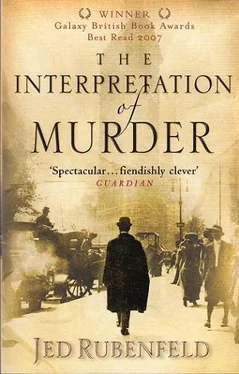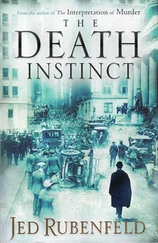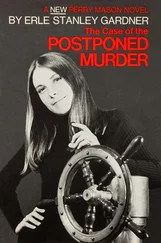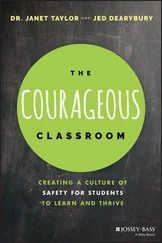Jed Rubenfeld - The Interpretation of Murder
Здесь есть возможность читать онлайн «Jed Rubenfeld - The Interpretation of Murder» весь текст электронной книги совершенно бесплатно (целиком полную версию без сокращений). В некоторых случаях можно слушать аудио, скачать через торрент в формате fb2 и присутствует краткое содержание. Жанр: Исторические приключения, на английском языке. Описание произведения, (предисловие) а так же отзывы посетителей доступны на портале библиотеки ЛибКат.
- Название:The Interpretation of Murder
- Автор:
- Жанр:
- Год:неизвестен
- ISBN:нет данных
- Рейтинг книги:5 / 5. Голосов: 1
-
Избранное:Добавить в избранное
- Отзывы:
-
Ваша оценка:
- 100
- 1
- 2
- 3
- 4
- 5
The Interpretation of Murder: краткое содержание, описание и аннотация
Предлагаем к чтению аннотацию, описание, краткое содержание или предисловие (зависит от того, что написал сам автор книги «The Interpretation of Murder»). Если вы не нашли необходимую информацию о книге — напишите в комментариях, мы постараемся отыскать её.
The Interpretation of Murder — читать онлайн бесплатно полную книгу (весь текст) целиком
Ниже представлен текст книги, разбитый по страницам. Система сохранения места последней прочитанной страницы, позволяет с удобством читать онлайн бесплатно книгу «The Interpretation of Murder», без необходимости каждый раз заново искать на чём Вы остановились. Поставьте закладку, и сможете в любой момент перейти на страницу, на которой закончили чтение.
Интервал:
Закладка:
'Very well,' said Clara, shooting me.
I had the distinct though unaccountable impression of seeing a bullet emerge from the cylinder of Clara s revolver, fly slowly toward me, and pierce my white shirt. I felt a twinge below my lowest left rib. Only then did I hear the shot.
The gun recoiled slightly. I seized Clara's wrists. She struggled to free herself, but couldn't. I forced her toward the balcony — I walking forward, she backward, the gun over our heads, pointed at the ceiling. Nora got up, but I shook my head. Clara kicked over an enormous table lamp in Nora's direction; it broke at her feet, sending a shower of glass onto her legs. I forced her on toward the balcony. We crossed its threshold. I pushed her roughly into the balcony railing, the gun still above our heads.
'It's a long way down, Mrs Banwell,' I whispered in the dark, wincing as the bullet worked its way among my entrails. 'Let go of the gun.'
'You can't do it,' she said. 'You can't kill me.'
'Can't I?'
'No. That's the difference between us.'
Suddenly my stomach felt as if a red-hot fire iron were inside it. I had been certain of my ability to prevent her from gaining the upper hand. Now I was certain no longer. I realized my strength might give way at any moment. The burning inside my ribs seized me again. I lifted her a foot off the floor, never letting go of her wrists, and landed her hard against the side wall of the balcony. We came to a standstill face to face, chest to chest, arms and hands entangled between our torsos, her back pressed to the wall, our eyes and mouths only a few inches apart. I looked down at Clara, and she up at me. Rage makes some women ugly, some more beautiful. Clara fell into the latter category.
She still had possession of the gun, her finger at the trigger, somewhere between our two bodies. 'You don't know which of us the gun is pointed at, do you?' I asked, pressing her even harder against the wall, forcing a gasp from her. 'Want to know? It's pointed at you. At your heart.'
I could feel the blood running copiously down my shirt. Clara said nothing, her eyes holding mine.
Gathering my strength, I went on. 'You're right, I might be bluffing. Why don't you pull the trigger and find out? It's your only chance. In a moment I'll overpower you. Go ahead. Pull the trigger. Pull it, Clara.'
She pulled the trigger. There was. a muffled blast. Her eyes opened wide. 'No,' she said. Her body went rigid. She looked at me, unblinking. 'No,' she repeated. Then she whispered: 'My act.'
The eyes never closed. Her body slackened. She fell, dead, to the floor.
I was now holding the gun. I went back inside the hotel room. I tried to go to Nora but didn't make it. Instead, I stumbled to the sofa. There I lowered myself, holding my stomach, the blood running out between my fingers, a large red stain expanding on my shirt. Nora ran to me.
'Heels,' I said. 'I like you in heels.'
'Don't die,' she whispered.
I didn't speak.
'Please don't die,' she begged me. 'Are you going to die?'
'I'm afraid so, Miss Acton.' I turned my gaze to Clara's corpse, then to the balcony railing, past which I could see a few stars in the faraway night. Ever since they illuminated Broadway, the twinkling of stars had become a lost sight over Midtown. Finally, I looked once more into Nora's blue eyes. 'Show me,' I said.
'Show you what?'
'I don't want to die not knowing.'
Nora understood. She turned her upper body, presenting her back to me, as she had on the day of our first session, in this same room. Lying back against the sofa, I reached out with one hand — my clean hand — and undid the buttons of her dress. When the back fell open, I loosened the ties of her corset and drew the eyelets apart. Behind the crisscrossing laces, below and between her graceful shoulder blades, there were several of the still-healing lacerations. I touched one. Nora cried out, then stifled her cry.
'Good,' I said, standing up from the sofa. 'That's settled then. Now let's call the police and get me some medical attention, don't you think?'
'But,' replied Nora, gazing up at me stupefied, 'you said you were going to die.'
'I am,' I replied. 'Someday. But not from this fleabite.'
Chapter Twenty-six
The moment I woke up, late Saturday morning, a nurse ushered in two visitors: Abraham Brill and Sandor Ferenczi.
Brill and Ferenczi sported wan smiles. They tried to brave it out, loudly asking how 'our hero' was doing, keeping at me until I had reprised the whole story, but in the end they couldn't hide their gloom. I asked what the matter was.
'It's all over,' said Brill. 'Another letter from Hall.'
'For you, in fact,' Ferenczi added.
'Which Brill read, naturally,' I concluded.
'For God's sake, Younger,' Brill exclaimed, 'for all we knew, you might be dead.'
'Making it open season on my correspondence.'
Hall's letter, it turned out, contained both good news and bad news. He had rejected the donation to Clark. He could not accept any funds, he explained, conditional on the university's relinquishing its academic freedom. But he had now made up his mind about Freud's lectures. Unless he heard positively from us by four o'clock today that the
Times would not be publishing the article he had seen, the lectures would be canceled. He was most apologetic. Freud would of course receive the full fee promised him. Hall would issue a statement that Freud's health precluded him from speaking. Moreover, as a replacement, Hall would select the one person he was certain Freud would want to deliver the keynote lectures in his place: Carl Jung.
It was the last sentence, I think, that galled Brill most. 'If we only knew who was behind it all,' he said. I could practically hear his teeth gnashing.
There was a knock at the door. Littlemore poked his head in. After making introductions, I urged Brill to describe our situation to the detective. He did, in complete detail. The worst of it, Brill concluded, was not knowing whom we were up against. Who would be so determined to suppress Freud's book and block his lectures in Worcester?
'If you want my advice,' said Littlemore, 'we ought to go have a little chat with your friend Dr Smith Jelliffe.'
'Jelliffe?' said Brill. 'That's ridiculous. He's my publisher. He can only gain from Freud's lectures going well. He's been pushing me to hurry the translation for months.'
'Wrong way to think about it,' answered Littlemore. 'Don't try to figure it out all at once. This Jelliffe guy gets your book manuscript, and when he gives it back to you it's full of weird stuff. And he says it was put there by some pastor who borrowed his printing press? Fishiest story I ever heard. He's the guy to talk to first.'
They tried to stop me, but I dressed to go with them. If I weren't such a fool, I would have asked for help tying my shoes; I nearly tore my stitches out doing it. Before Jelliffe's, we made a stop at Brill's apartment. There was one item of evidence Littlemore wanted us to take uptown.
Littlemore waved to an officer in the lobby of the Balmoral. The police had been combing the Banwells' now-empty apartment all morning. Already a favorite among the uniformed men, Littlemore had suddenly become a figure of stature. News of his taking both Banwell and Hugel had spread all over the force.
Smith Ely Jelliffe opened his door clad in pajamas, a wet towel over his head. The sight of Drs. Younger, Brill, and Ferenczi startled him, but his surprise grew to alarm when he saw his nemesis, the detective from last night, jauntily following behind them.
'I didn't know,' Jelliffe blurted out to Littlemore. 'I didn't know anything about it until after you left. He was in town for only a few hours. There was no incident of any kind, I swear it. He's back at the hospital already. You can call. It won't happen again.'
Читать дальшеИнтервал:
Закладка:
Похожие книги на «The Interpretation of Murder»
Представляем Вашему вниманию похожие книги на «The Interpretation of Murder» списком для выбора. Мы отобрали схожую по названию и смыслу литературу в надежде предоставить читателям больше вариантов отыскать новые, интересные, ещё непрочитанные произведения.
Обсуждение, отзывы о книге «The Interpretation of Murder» и просто собственные мнения читателей. Оставьте ваши комментарии, напишите, что Вы думаете о произведении, его смысле или главных героях. Укажите что конкретно понравилось, а что нет, и почему Вы так считаете.












